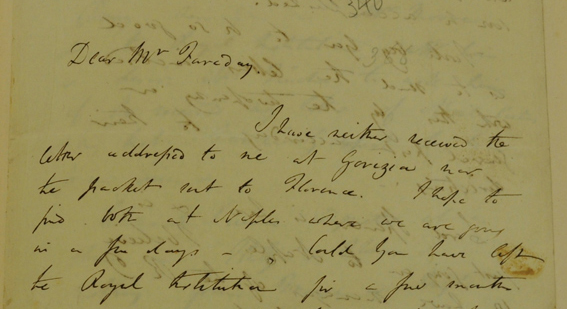Dr Andrew Lacey, of the Department of English and Creative Writing, on the Davy Letters Project, which is preparing for publication the c. 1150 surviving letters of Sir Humphry Davy
Sir Humphry Davy (1778-1829) was one of most influential and best-known scientists in an era before ‘science’ became a professionalised discipline. Davy’s scientific accomplishments were varied and numerous, including conducting pioneering research into the physiological effects of nitrous oxide (laughing gas); isolating potassium, calcium, and several other metals; inventing a miners’ safety lamp, which saved many lives below ground; developing the electrochemical protection of the copper sheeting of Royal Navy vessels; conserving the Herculaneum papyri; writing an influential text on agricultural chemistry; and seeking to improve the quality of optical glass. But Davy’s endeavours were not merely limited to science: he was also a poet, and moved in the same literary circles as writers such as Lord Byron, Samuel Taylor Coleridge, Robert Southey, and William Wordsworth.
In spite of the heights to which Davy rose, the pinnacle of which was his election to the Presidency of the Royal Society in 1820, very few of his letters have appeared in print edited to modern standards. In response to this, Professors Sharon Ruston (of the Department of English and Creative Writing) and Tim Fulford (De Montfort University) are co-editing The Collected Letters of Sir Humphry Davy: the four-volume edition of Davy’s correspondence that will mark the culmination of the Davy Letters Project. The edition, currently in preparation, also benefits from the input of three advisory editors – Professors Jan Golinski (University of New Hampshire), Frank James (the Royal Institution of Great Britain), and David Knight (Durham University) – as well as myself, as Modern Humanities Research Association-funded Research Associate.
The Collected Letters, which will be published in both print and electronic form by Oxford University Press in 2018, will shed much-needed new light on one of the most brilliant experimentalists and innovators Britain has produced, increasing our understanding of the relationship between nineteenth-century science and literature, and making an important contribution to the study of Romantic-period letters. The edition will provide complete, fully annotated texts of the letters, making Davy’s scientific terminology more intelligible to contemporary readers and expanding our knowledge of the scientific and literary networks of which he was part. It will feature previously unpublished letters to such notable correspondents as André-Marie Ampère (the physicist who founded and named the science of electrodynamics), Sir Joseph Banks (the naturalist and patron of science), William Godwin (the political philosopher and novelist), Sir John Herschel (the mathematician and astronomer), Alexander von Humboldt (the geographer, naturalist, and explorer), James Watt (the engineer and manufacturer), and Josiah and Thomas Wedgwood (of the pottery manufacturing family), as well as others.

Davy’s manuscript letters are held in archives – primarily in research libraries, but also in museums, public record offices, and learned societies – all over the world. Some letters also remain in private hands. Wherever possible, the editors have consulted the original manuscript letters and made meticulous transcriptions of the texts, which have then been uploaded to an online database in preparation for their inclusion in the edition.
At present, the editorial team is hard at work annotating Davy’s early letters, to correspondents including Grace Davy (his mother), William Nicholson (proprietor of the Journal of Natural Philosophy, Chemistry, and the Arts, in the pages of which Davy announced several important discoveries), Joseph Cottle (the Bristol publisher of Coleridge and Robert Southey), Marc-Auguste Pictet (the Swiss physicist, chemist, meteorologist, and astronomer), and Davies Giddy (Davy’s eventual successor to the Presidency of the Royal Society).
Future plans for the Project include publishing several articles relating to the discoveries made so far during the editing process, as well as running a number of public events, including workshops on Davy’s life, his letter writing, and the scientific and literary cultures in which he lived.
The Collected Letters of Sir Humphry Davy, gen. eds. Tim Fulford and Sharon Ruston, advisory eds. Jan Golinski, Frank James, and David Knight, 4 vols (Oxford University Press, expected 2018). For further information, see http://www.davy-letters.org.uk.
Disclaimer
The opinions expressed by our bloggers and those providing comments are personal, and may not necessarily reflect the opinions of Lancaster University. Responsibility for the accuracy of any of the information contained within blog posts belongs to the blogger.


